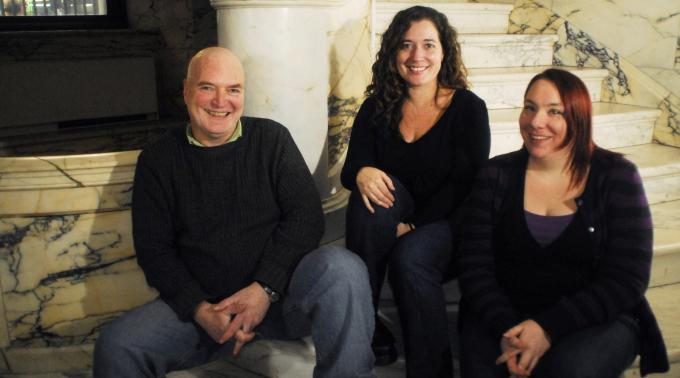Creative Writing students explore fiction, poetry and other genres
Cultivating Young Writers

Creative Writing faculty members (from left) William Purcell, Karen Dwyer and Sarah Perrier.
The Point
Fall 2012
The best aspiring writers are inquisitive by nature, says Sarah Perrier, Ph.D., assistant professor of creative writing. "Talented and committed writers show curiosity and interest in tracking down details."
And they see possibilities around every corner, adds Assistant Professor Karen Dwyer, Ph.D. "They are busy being in the world and pursuing their interests. Then they write about their experiences."
Point Park has a growing community of students putting experiences into words using creative nonfiction, fiction, poetry and other creative genres. They're arriving from throughout the University to take advantage of Point Park's craft-oriented writing workshops and intensive literary seminars.
Perrier, an award-winning poet, came in 2008 to create the workshop classes and help expand a creative writing concentration into a Bachelor of Arts in English/Creative Writing. Dwyer, an award-winning fiction writer, joined her a year later. The two put the degree program in place by fall 2010, then watched it grow from five to 24 full- and part-time students in only a year.
The students' interest reflects the dynamic growth in creative writing degree programs across the country, says Perrier.
The Association of Writers and Writing Programs reports more than 150 member schools with B.A. or B.F.A. creative writing programs in 2010, up from only three in 1975. Point Park University is now a part of the professional association and its growing tally.
Perrier, Dwyer and psychology professor and longtime writing instructor William Purcell offer a full slate of introductory and advanced writing workshops designed to allow students to refine individual works and receive informed feedback from faculty and fellow students.
This past year, Dwyer and Perrier began offering creative-writing focused sections of World Literature I, a course in the core curriculum that introduces students from every major to reading and responding to literary texts. One of the goals was to have students try out writing creatively in response to works by established authors.
"These students used writing to learn about literature instead of the reverse," says Perrier.
The students wrote short plays, poems and short stories after reading works by author Jonathan Franzen, playwright Paula Vogel, poet Sandra Beasley, poet and dramatist Edmond Rostand, writer David Foster Wallace, and others. One assignment involved writing about listening to music after students read selections by author Nick Hornby and Rolling Stone Magazine writer Rob Sheffield. The assignment appealed to the students because it combined writing and music, says Perrier, and it helped them to realize the challenges of writing about artistic pursuits.
Students and professors agree Point Park's creative population provides a natural base for a strong writing culture.
A number of students combine an English/creative writing major or minor with a course of study from other school. One such student, Scott Romani, graduated in May with a dance degree from the Conservatory of Performing Arts and a creative writing degree from the School of Arts and Sciences. He is now studying in the University of Pittsburgh's M.F.A. program in creative writing.
"Point Park prepared me well for applying to graduate school," says the 23-year-old.
Part of that preparation is a senior seminar called Craft and Critique, where students complete a series of works and a 20-40 page critical analysis situating their creative work within the genre.
"I had really great mentors in the creative writing program," says Romani, who continues to work in short fiction and poetry. "I started writing at the end of my sophomore year, so I was a late starter. The fact that a year and a half later I was accepted into graduate school speaks for itself about the quality of Point Park's creative writing program."
On Writing Well
Point Park offers all students help in becoming more proficient writers so they can succeed in their academic work and prepare for the workforce.
"If you can't write, you are narrowing your opportunities in every career," says Robert Alexander, Ph.D., professor of English.
One of the latest ways Point Park offers help with writing composition is through Studio Writing classes for freshmen and sophomores enrolled in English Composition and World Literature classes. The new one-credit courses, which are offered pass-fail, use small groups, conferences and lab time to provide individual instruction for work assigned in the writing-intensive core courses.
"Statistics and research show that that students who need help with their writing progress faster and do better with core courses when they take the extra class," says Alexander.
The Writing Center at the Program for Academic Success (PAS) also offers assistance with English assignments and writing projects in courses across the curriculum. Students can make 30- or 60-minute appointments or drop in to 703 Lawrence Hall. The Writing Center even offers online tutoring.
Alexander, who has taught at Point Park for 40 years, says students have a wide range of options for finding writing assistance.
"We are dedicated to providing students with help at every point in the writing process."
Text by Colleen Derda
The Point is a magazine for alumni and friends of Point Park University.

